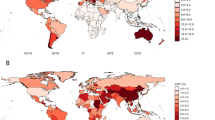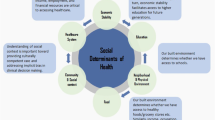Abstract
The COVID-19 pandemic has significantly impacted individuals’ financial well-being and mental health. This study investigates the relationship between income loss and mental health outcomes during the pandemic, as well as the heterogeneity in this relationship by race/ethnicity and co-ethnic density in the metropolitan area. Using nationally representative Household Pulse Survey data, this study finds that income loss is associated with a heightened risk of depression and anxiety, even after controlling for individual and metropolitan-level characteristics. Co-ethnic density in metropolitan areas worsens the effects of income loss on depression and anxiety for Hispanics and non-Hispanic Blacks while residing in a metropolitan area with more Whites cushions the impact of income loss on depression and anxiety for non-Hispanic Whites. Overall, the study underscores the importance of considering the intersection of race/ethnicity and metropolitan-level co-ethnic density in exploring the influence of economic stressors on mental health.
Similar content being viewed by others
References
U.S. Bureau of Labor Statistics. Accessed April 16, 2020. https://www.bls.gov/
Deane C, Parker K, Gramlich J. A year of U.S. public opinion on the coronavirus pandemic. Published online March 5, 2021. Accessed December 16, 2023. https://policycommons.net/artifacts/1426153/a-year-of-us/2040545/
Ettman CK, Abdalla SM, Cohen GH, Sampson L, Vivier PM, Galea S. Prevalence of depression symptoms in US adults before and during the COVID-19 pandemic. JAMA Netw Open. 2020;3(9):e2019686. https://doi.org/10.1001/jamanetworkopen.2020.19686.
Li X, Lu P, Hu L, Huang T, Lu L. Factors associated with mental health results among workers with income losses exposed to COVID-19 in China. Int J Environ Res Public Health. 2020;17(15):5627. https://doi.org/10.3390/ijerph17155627.
Hibel LC, Boyer CJ, Buhler-Wassmann AC, Shaw BJ. The psychological and economic toll of the COVID-19 pandemic on Latina mothers in primarily low-income essential worker families. Traumatology. 2021;27(1):40–7. https://doi.org/10.1037/trm0000293.
Saenz R, Sparks C. The inequities of job loss and recovery amid the COVID-19 pandemic. Carsey Sch Public Policy Sch Repos. Published online August 11, 2020. https://doi.org/10.34051/p/2021.3
Wu YY, Walkover M, Zhang W. Trends in psychological distress and COVID-19 incidence across 15 U.S. metropolitan statistical areas in 2020. Soc Sci Med. 2021;285:114285. https://doi.org/10.1016/j.socscimed.2021.114285.
Fryer D, Payne R. Being unemployed: a review of the literature on the psychological experience of unemployment. Int Rev Ind Organ Psychol. 1986;1(1):235–77.
Thoits PA. Personal agency in the stress process. J Health Soc Behav. 2006;47(4):309–23. https://doi.org/10.1177/002214650604700401.
Lopes L, Kearney A, Kirzinger A, Hamel L, Published MB. KFF health tracking poll: economic hardship, health coverage, and the ACA. KFF. Published March 3, 2021. Accessed December 18, 2023. https://www.kff.org/coronavirus-covid-19/poll-finding/kff-health-tracking-poll-late-february-2021/
Pearlin LI, Menaghan EG, Lieberman MA, Mullan JT. The stress process. J Health Soc Behav. 1981;22(4):337–56. https://doi.org/10.2307/2136676.
Paul KI, Moser K. Unemployment impairs mental health: meta-analyses. J Vocat Behav. 2009;74(3):264–82. https://doi.org/10.1016/j.jvb.2009.01.001.
Broman CL, Hamilton VL, Hoffman WS. Unemployment and its effects on families: evidence from a plant closing study. Am J Community Psychol. 1990;18(5):643–59. https://doi.org/10.1007/BF00931235.
Couch KA, Fairlie RW, Xu H. Early evidence of the impacts of COVID-19 on minority unemployment. J Public Econ. 2020;192:104287. https://doi.org/10.1016/j.jpubeco.2020.104287.
Fairlie RW, Couch K, Xu H. The impacts of COVID-19 on minority unemployment: first evidence from April 2020 CPS microdata. Published online May 2020. https://doi.org/10.3386/w27246
Strully K. Racial-ethnic disparities in health and the labor market: losing and leaving jobs. Soc Sci Med. 2009;69(5):768–76. https://doi.org/10.1016/j.socscimed.2009.06.025.
Pager D, Shepherd H. The sociology of discrimination: racial discrimination in employment, housing, credit, and consumer markets. Annu Rev Sociol. 2008;34(1):181–209. https://doi.org/10.1146/annurev.soc.33.040406.131740.
Farrell D, Greig F, Zhao C. Did mortgage forbearance reach the right homeowners? Income and liquid assets trends for homeowners during the COVID-19 pandemic. Published online December 3, 2020. https://doi.org/10.2139/ssrn.3742332
Feder A, Nestler EJ, Charney DS. Psychobiology and molecular genetics of resilience. Nat Rev Neurosci. 2009;10(6):446–57. https://doi.org/10.1038/nrn2649.
Sampson RJ. Great American city: Chicago and the enduring neighborhood effect. Chicago, IL: University of Chicago Press; 2012.
Sampson RJ. Urban sustainability in an age of enduring inequalities: advancing theory and ecometrics for the 21st-century city. Proc Natl Acad Sci. 2017;114(34):8957–62. https://doi.org/10.1073/pnas.1614433114.
Yang TC, Shoff C, Noah AJ, Black N, Sparks CS. Racial segregation and maternal smoking during pregnancy: a multilevel analysis using the racial segregation interaction index. Soc Sci Med. 2014;107:26–36. https://doi.org/10.1016/j.socscimed.2014.01.030.
Kandel W, Massey DS. The culture of Mexican migration: a theoretical and empirical analysis*. Soc Forces. 2002;80(3):981–1004. https://doi.org/10.1353/sof.2002.0009.
Portes A. Social capital: its origins and applications in modern sociology. Annu Rev Sociol. 1998;24(1):1–24. https://doi.org/10.1146/annurev.soc.24.1.1.
Leclere FB, Jensen L, Biddlecom AE. Health care utilization, family context, and adaptation among immigrants to the United States. J Health Soc Behav. 1994;35(4):370–84. https://doi.org/10.2307/2137215.
Lee MA, Ferraro KF. Neighborhood residential segregation and physical health among Hispanic Americans: good, bad, or benign? J Health Soc Behav. 2007;48(2):131–48. https://doi.org/10.1177/002214650704800203.
Donnelly R, Zajdel R, Farina MP. Inequality in household job insecurity and mental health: changes during the COVID-19 pandemic. Work Occup. 2022;49(4):457–82. https://doi.org/10.1177/07308884221123255.
Gilbody S, Richards D, Brealey S, Hewitt C. Screening for depression in medical settings with the Patient Health Questionnaire (PHQ): a diagnostic meta-analysis. J Gen Intern Med. 2007;22(11):1596–602. https://doi.org/10.1007/s11606-007-0333-y.
Purtle J. COVID-19 and mental health equity in the United States. Soc Psychiatry Psychiatr Epidemiol. 2020;55(8):969–71. https://doi.org/10.1007/s00127-020-01896-8.
Wilkinson LR. Financial strain and mental health among older adults during the great recession. J Gerontol Ser B. 2016;71(4):745–54. https://doi.org/10.1093/geronb/gbw001.
Yang TC, Lei L, Kurtulus A. Neighborhood ethnic density and self-rated health: investigating the mechanisms through social capital and health behaviors. Health Place. 2018;53:193–202. https://doi.org/10.1016/j.healthplace.2018.08.011.
Shankley W, Laurence J. Community ethnic density, ethnic segregation, and ethnic minorities’ common mental disorders in the UK. Health Place. 2022;73:102723. https://doi.org/10.1016/j.healthplace.2021.102723.
Curtis DS, Washburn T, Lee H, et al. Highly public anti-Black violence is associated with poor mental health days for Black Americans. Proc Natl Acad Sci U S A. 2021;118(17):e2019624118. https://doi.org/10.1073/pnas.2019624118.
Gemelas J, Davison J, Keltner C, Ing S. Inequities in employment by race, ethnicity, and sector during COVID-19. J Racial Ethn Health Disparities. 2022;9(1):350–5. https://doi.org/10.1007/s40615-021-00963-3.
Bitler M, Hoynes HW, Schanzenbach DW. The social safety net in the wake of COVID-19. Published online September 2020. https://doi.org/10.3386/w27796
Acknowledgements
This research was supported by a grant from Internal Research Awards Program from the University of Texas at San Antonio. The author thanks Corey Sparks for his assistance with the data extraction, Jianfeng He for his excellent research assistance, and several annonymous reviewers for helpful comments.
Author information
Authors and Affiliations
Corresponding author
Additional information
Publisher's Note
Springer Nature remains neutral with regard to jurisdictional claims in published maps and institutional affiliations.
Rights and permissions
Springer Nature or its licensor (e.g. a society or other partner) holds exclusive rights to this article under a publishing agreement with the author(s) or other rightsholder(s); author self-archiving of the accepted manuscript version of this article is solely governed by the terms of such publishing agreement and applicable law.
About this article
Cite this article
Huang, Y. Income Loss and Mental Health during the COVID-19 Pandemic in the United States—Investigating the Moderating Role of Race and Metro-Level Co-ethnic Density. J Urban Health 101, 205–217 (2024). https://doi.org/10.1007/s11524-024-00826-2
Accepted:
Published:
Issue Date:
DOI: https://doi.org/10.1007/s11524-024-00826-2




